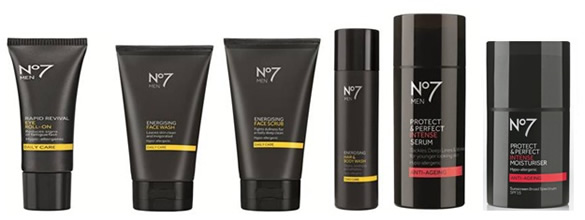Living
Cupid ain’t stupid
Valentine’s Gifts that’ll getcha some


The best thing about Valentine’s Day is that it really is the thought that counts. (People lie about that at Christmastime, ya know.)
By MIKEY ROX
To help you pick the perfect gift for your sweetie this Valentine’s Day, here’s our list of fun and frisky ideas that he (or she!) will love to unwrap.
Boots No7 Men Grooming Products

Boots No7 Men Grooming Products
If your main squeeze likes to primp and preen like everyday is a walk down a rainbow carpet, his heart will skip a beat with a gift from Boots No7 Men this Valentine’s Day. Boots No7 Men was launched in the United States earlier this year (it originally hails from jolly ol’ England), introducing a new line of products dedicated to dapper chaps while offering the same Boots formula as the coveted women’s collection. ($7.99-$22.99; walgreens.com)

Between Me and You Honey Journal
Between Me and You Honey Journal
Think you know everything about your significant other? Think again. You two can build a relationship that’s closer and more honest than ever with the Between Me and You Honey Journal, a handsome spiral-bound notebook dedicated to sharing personal experiences, life stories, hopes, fears, fantasies and more. ($14.95; sanddunebooks.com)

The HomeMade Gin Kit
The HomeMade Gin Kit
There’s nothing more satisfying than coming home from a long day at the office and enjoying a freshly prepared cocktail with your sweetie — unless, of course, that cocktail is made from a DIY gin that you two have created yourselves. Salud! ($49.95; homemadegin.com)

LifeStyles
LifeStyles Pleasure Products
Sex is in the air on Valentine’s Day, but it’s important to play it safe. Whether you’re rekindling the romance in your marriage on Feb. 14 or just kickin’ it with a rando you picked up at the “I Hate Cupid” happy hour, LifeStyles has a wide selection of pleasure products to set the mood and make bedtime a bit more exciting. (Prices vary; lifestyles.com)
Cocoa Canard Spooning Chocolate

Cocoa Canard Spooning Chocolate
Thanks to Cocoa Canard, lactose-intolerant and celiac-suffering chocoholics can celebrate with the rest of Cupid’s cocoa-covered targets with Spooning Chocolate, the first dairy- and gluten-free pure, non-bitter dark chocolate that instantly dissolves in a cup of hot water. The makers like to call it the Espresso of Hot Chocolate, but you’ll probably just call it liquid yum. To enhance the gift-giving experience, Cocoa Canard has put together a handsome gift package, which includes a can of Spooning Chocolate, Spooning Mug, and personalized stationery. ($24.95; cocoacanard.com)
Secretions Magnifiques Eau de Parfum
Have you ever wanted to bottle-up the scent of a swaggery, sweaty man to whiff whenever you want? Secretions Magnifiques Eau de Parfum by Etat Libre d’Orange has perfected that formula in a new scent that all at once blends sex, saliva, skin and sandalwood (among other tantalizing aromatics) into a mesmerizing and masculine grooming spray perfect for giving the one you love — or keeping for yourself and owning your new status as a walking aphrodisiac. ($80; minnewyork.com)

‘See a Heart, Share a Heart’ photo book
‘See a Heart, Share a Heart’ photo book
It may not seem like there’s a whole lot of heart left in this wacky world we live in, but it’s there – you just have to look hard enough. That’s how photographer Eric Telchin stumbled upon his latest project and gift book, “See a Heart, Share a Heart,” which features found hearts in the most mundane of places like sweaters, sidewalks, leaves and animal fur. ($10.70; amazon.com)
FreshNeck subscription
Give the debonair gift that keeps on giving this Valentine’s Day with a subscription to FreshNeck, AKA the Netflix for ties. Your guy will always step out in style with this service that allows him to pick his favorite ties from a robust selection of neckwear and add them to his “Closet” (fancy name for queue), and in one to three business days his top picks will arrive. When he wants to switch it up again, he just sends the ties back in the provided prepaid envelope and awaits his new arrivals. FreshNeck also offers a variety of bowties, pocket squares and cufflinks so he can dress to the nines every day of the week. ($20-$55/month; freshneck.com)

‘Eye Heart You’ artwork
‘Eye Heart You’ artwork
If your sweetie skews a little funky with a dash of the morbid, he or she might appreciate this interesting work of art entitled “Eye Heart You,” which spells out the affectionate sentiment of “I Love You” in a rebus — for the most part, anyway. In place of the first two words are stitched pictures that feature an eye and an anatomically correct heart, respectively, and then the word “you.” The 5×7-inch piece is set in an ash wood frame and comes ready to hang. ($41; stillhousenyc.com)
Égalité Wine
Égalité Wine
Even if you’re not a wine-and-dine couple (and who can blame you? It’s totally overrated), you can still mark this special occasion with a toast on the couch — and supporting the fight for equal rights while you’re at it. Égalité wine, introduced early last year, is the first nationally distributed wine created in support of the LGBT equality in the United States and around the world. Meaning equality, Égalité is both a reflection of the wine’s French origin and a celebration of equality for gay Americans. Since its launch, the brand has contributed more than $20,000 in cash and product to LGBT organizations. ($22.99; wine.com)

Nasty Pig Baller Line
Nasty Pig Baller Line
Turn up the heat in the bedroom this Valentine’s Day without touching the thermostat with Nasty Pig’s new Baller line of undergarments, featuring red-hot socks, briefs and jocks sure to excite that adorable fetishist who shares your bed. Also available in green if you’re trying to send that “go-ahead” message from the get-go, these latest additions are full of frisky pop to make his tightening denim drop. ($16-29; store.nastypig.com)
Mikey Rox is an award-winning journalist and blogger who lives in New York City with his husband and their two dogs. Follow him on Twitter @mikeyrox.
Want to stay local? Here are a few D.C. spots to get great Valentine’s Day gifts

Did you melt like the Wicked Witch of the West this week?
As summer temperatures rise, keeping your home or apartment cool during a heat wave can become both a comfort issue and a financial challenge. One of the most effective ways to keep a home cool is to prevent heat from entering in the first place. Sunlight streaming through windows can significantly raise indoor temperatures. Consider the following solutions:
• Close blinds or curtains during the hottest parts of the day. Blackout curtains or thermal drapes can reduce heat gain by up to 30%.
• Install reflective window films to block UV rays and reduce solar heat without sacrificing natural light.
• Use outdoor shading solutions such as awnings (yes, the ones you removed because they were “dated”) and shutters to limit direct sunlight.
Fans are a cost-effective way to circulate air and create a wind-chill effect that makes rooms feel cooler.
• Ceiling fans should rotate counterclockwise in the summer to push cool air down.
• Box fans or oscillating fans can be placed near windows to pull in cooler evening air or push hot air out.
• Create a cross-breeze by opening windows on opposite sides of your home and positioning fans to direct airflow through the space.
• For an extra cooling effect, place a bowl of ice or a frozen water bottle in front of a fan to circulate chilled air.
To optimize natural ventilation, open windows early in the morning or late in the evening when outdoor temperatures drop. This allows cooler air to flow in and helps ventilate heat that built up during the day.
Appliances and electronics generate a surprising amount of heat. To reduce indoor temperatures:
• Avoid using the oven or stove during the day; opt for no-cook meals, microwave cooking, or grilling outside.
• Run heat-producing appliances like dishwashers and clothes dryers in the early morning or late evening.
• Unplug electronics when not in use, as even standby power can add heat to your space.
• Switching to energy-efficient LED lightbulbs can also reduce ambient heat compared to incandescent lighting.
If you do use an air conditioner, maximize its effectiveness by:
• Setting it to a reasonable temperature—around 76–78°F when you’re home and higher when you’re away.
• Cleaning or replacing filters regularly to maintain airflow and efficiency.
• Sealing gaps around doors and windows to prevent cool air from escaping. (Didn’t we all have a parent who said, “Close the door. You’re letting all the cool out?”)
• Using a programmable thermostat to optimize cooling schedules and reduce energy use.
If it is not cost-prohibitive, adding insulation in attics and walls can greatly reduce heat transfer. Solar panels that reflect heat can also help, as well as offset the cost of their installation. Adding weatherstripping around doors and windows, sealing cracks, and using door sweeps can make a significant difference in keeping heat out and cool air in.
Natural and eco-conscious methods can also help cool your home.
• Snake plants, ferns, or rubber trees can improve air quality and slightly cool the air through transpiration.
• White or reflective roof paint can reduce roof temperatures significantly.
• Cooling mats or bedding can make sleeping more comfortable without cranking up the A/C.
For renters or those who can’t make permanent modifications, there are still plenty of ways to keep cool.
• Use portable fans and A/C units instead of built-in systems, making sure they are the correct size for your space.
• Removable window film or static cling tinting can reflect heat without violating your lease.
• Install tension rod curtains or temporary blackout panels instead of hardware-mounted window coverings.
• Add draft blockers and weatherstripping tape that can be applied and removed without damage.
• Cover floors with light-colored rugs to reflect heat rather than absorb it.
• If allowed, use temporary adhesive hooks to hang reflective materials or light-filtering fabrics over windows.
Even if your space is warm, you can still take steps to help your body stay cool.
• Wear light, breathable fabrics like cotton or linen.
• Stay hydrated and avoid caffeine or alcohol during peak heat hours.
• Take cool showers or use damp cloths on your neck and wrists to bring your body temperature down.
Keeping your home or apartment cool in the summer doesn’t have to be expensive or energy-intensive. With a few adjustments such as blocking sunlight, optimizing airflow, using fans effectively, and making renter-friendly upgrades, you can create a more comfortable indoor environment while keeping energy bills in check.
Valerie M. Blake is a licensed Associate Broker in D.C., Maryland, and Virginia with RLAH @properties. Call or text her at 202-246-8602, email her at DCHomeQuest.com, or follow her on Facebook at TheRealst8ofAffairs.
Real Estate
The world’s on fire and D.C. is on sale (sort of)
Prices are up, but then again, nothing makes sense anymore

ICE is disappearing people, revered government agencies are shuttering, and who knows if we’ll be in World War III next week? But can you believe prices in D.C. are actually still up 6.3% since last year? It doesn’t make sense, and perhaps that does make sense, because nothing seems to make any sense any more.
That said, there are some parts of our market that are truly suffering. The interest rates, which have been up, up, up for about four years now, are the ongoing rain on our market’s military parade. Combine that with 75,000 federal employees taking a buyout nationwide, and DOGE cuts eliminating around 40,000 federal jobs in the District (per estimates by the D.C. CFO), not to mention thousands of other job losses in non-governmental organizations due to funding and program cuts, and you’ve got a case of uncertainty, and downright unaffordability in the pool of otherwise would-be buyers.
This has had a marked impact on properties that starter-home buyers and low- to mid-level employees would otherwise buy, most notably condominium and cooperative apartment units. These properties have already slowed in our market thanks to the profound impact that higher interest rates have had on their monthly carrying costs—pair that with job insecurity, and a lot of condos are proving to be very difficult to sell indeed.
So how is the average sale price up in our market?
The increase is almost entirely due to the resounding strength of the single-family home market, especially in upper Northwest D.C., where it is still quite common to see bidding wars, even on properties pushing past the $3M mark. It seems that buyers in that echelon are less impacted by a few percentage points in the interest rate, and less concerned about their job security. Notably, those buyers are often married with children and have an absolute need for more space, must stay in the area due to one spouse’s job, or the kid’s friend group, regardless of whether the cost of owning is thousands of dollars more per month than it would have been in 2020 or 2021. The continued appreciation in these neighborhoods defies imagination.
So, what to do if you are not one of those lucky enough to be shopping for a $3M home? The short answer: wait. If you want more space, rent your current place out and learn the joys of being a landlord while someone else pays your mortgage. Need the equity from your current home to buy your next place? Get a home equity line of credit, or loan, and pull the equity out of your current place to buy the next one. Or—and I have never recommended this before in 21 years of being a Realtor—rent for a few years. Sure, I’d love to list and sell your condo so you can climb the real estate ladder, but it might just be a waste of time, money or both if you could just ride out this storm and sell in a DOGE-less future.
All this said, there are some condos that seem to be immune from this recent negative news. Anecdotally, it feels like it’s the truly special ones that do just fine no matter the market. Our recent listing in Capitol Hill had a view from every one of its 15 windows of the Supreme Court. Sold in five days with six offers. Another condo was on the top two floors of a townhouse and had the coolest black wood floors that gleamed like a grand piano. Sold in four days at full price.
So, all is not for naught if you have a condo or home in an area that people want to be in, with nice space, light, amenities and a certain je ne sais quois. And, as long as we have a democracy in a few years, my experience says our market will be back, stronger than ever, really soon.
David Bediz is a Realtor and mortgage loan broker for the Bediz Group LLC and Home Starts Here, LLC. Reach him at [email protected].

In this corner, there’s the Genesis QV70, newly updated and full of glitzy gizmos. And in the opposing corner, there’s the Lexus NX, a fan fave known for comfort and reliability.
Both are strong contenders. Both have proven to be equally adept at bobbing and weaving through traffic. And both can go toe to toe with pricier competitors.
And yet, what would happen when they sparred against each other? Here’s your ringside seat to find out.
GENESIS QV70

$50,000
MPG: 22 city/28 highway
0 to 60 mph: 5.9 seconds
Cargo space: 28.9 cu. ft.
PROS: Stylish. Good value. Lots of standard amenities.
CONS: So-so fuel economy. Quirky dash controls.
IN A NUTSHELL: When it comes to speed, the Genesis QV70 is faster on its feet than the Lexus NX. Neither of these crossover SUVs is a lightweight, but the QV70 offers more potent powerplants—including an all-electric version that zips from 0 to 60 mph in just 3.8 seconds. In other words, Porsche Macan S territory.
The two gas-powered options—a four-cylinder turbo and twin-turbo V6—also got my blood pumping. So did the velvetlike suspension mixed with deft handling and stop-on-a-dime braking. But this adrenaline rush comes at a cost: sacrificing fuel economy.
As for the automaker’s design philosophy—“athletic elegance”—it’s on full display here: an oversized grille inspired by the Genesis emblem, the dramatically arcing silhouette, and those distinct quad headlights and taillights. It’s not easy to stand out when 25% of all vehicles sold in the U.S. are compact crossovers, so kudos to the QV70 for being such a head-turner.
The mod-yet-minimalist styling carries over to the cabin, with its high-quality materials: real-wood accents, soft-touch plastics and a tasteful glass shift knob. New this year is a sweeping 27-inch dashboard monitor, which houses the gauge cluster and infotainment touchscreen. Alas, this display is positioned a bit far from the driver (though I must admit reaching for it did help stretch a few tight back muscles).
Instead of being a costly extra, this gigantic monitor comes standard. So do synthetic leathers seats, nine-speaker stereo, smartphone/wireless connectivity, hands-free liftgate, tons of safety gear and more. Options include a panoramic sunroof, three-zone climate control, 16-speaker Bang & Olufsen audio, synthetic suede headliner, sound-reducing rear windows, automated parking and other goodies.
What’s the score so far? Despite some minor quibbles, the Genesis QV70 is a worthy challenger that pulls no punches.
LEXUS NX

$43,000
MPG: 26 city/33 highway
0 to 60 mph: 8.2 seconds
Cargo space: 22.7 cu. ft.
PROS: Fuel efficient. Comfy seats. Rock-solid reliability.
CONS: Pokey base model. Limited rear storage.
IN A NUTSHELL: Sure, the Lexus NX isn’t as speedy as the Genesis QV70. But, as with the tortoise and the hare, sometimes slow and steady wins the race. And really, it’s only the entry-level NX that feels sluggish, such as when trying to quickly merge into freeway traffic.
Other trim levels, including two hybrid options, are just fine. And no matter the engine choice, the counterpunch here is that these vehicles get better gas mileage: 20% higher fuel economy than in either the four-cylinder or V6 in the Genesis. The two NX hybrids are even more green, with the high-end plug-in version able to travel up to 37 miles on electric power alone. One downside: There is no all-electric NX—well, at least not yet.
As with parent-company Toyota, Lexus offers stellar vehicle reliability—often ranked No. 1 in dependability and crash-test surveys year after year. Lexus vehicles generally hold their value better than Genesis, because this newer brand has a shorter history. Lexus also has a larger dealer network, though the number of Genesis dealerships is growing.
But when it comes to cargo space, the NX is about two inches shorter and narrower than the QV70, which has more stowage area. And Genesis handling is sportier, though the Lexus feels sure and well-grounded.
Luxe interior amenities are basically the same in both vehicles. But interior styling in the QV70 is trendy, while the NX is more understated. In other words, a choice between sassy and classy.
This is a very competitive vehicle segment, with Euro models like the Audi Q5, BMW X3 and Mercedes GLC also duking it out in what seems like a clash of the titans.
But as for the Genesis QX70 or Lexus NX, which is the winner? For me, both are real knockouts—so I’d call it a draw.
-

 U.S. Supreme Court3 days ago
U.S. Supreme Court3 days agoSupreme Court upholds ACA rule that makes PrEP, other preventative care free
-

 U.S. Supreme Court3 days ago
U.S. Supreme Court3 days agoSupreme Court rules parents must have option to opt children out of LGBTQ-specific lessons
-

 India5 days ago
India5 days agoIndian court rules a transgender woman is a woman
-

 National5 days ago
National5 days agoEvan Wolfson on the 10-year legacy of marriage equality












